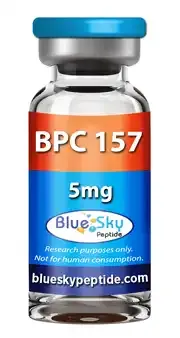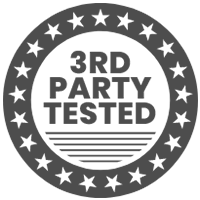45% Off Everything*
Save Now!!

Availability: In stock

| Unit Size | 5 mg/vial |
| Unit Quantity | 1 vial |
| Purity (Mass Spectrometry and UV) | 100% |
| Sequence | H-Gly-Glu-Pro-Pro-Pro-Gly-Lys-Pro-Ala-Asp-Asp-Ala-Gly-Leu-Val-OH |
| Molecular Formula | C62H98N16O22 |
| Molecular Mass | 1418.70 |
| Molecular Weight | Confirmed |
| Appearance | Lyophilized White Powder |
| Source | Chemical Synthesis |
| Storage |
Lyophilized BPC 157 is Stable at room Temperature for 90 days, however it is best to store in a freezer below - 8c for any extended period of time. After reconstitution BPC 157 should be refrigerated at temperatures not to exceed 35 F. |
| Terms | The products we offer are intended for laboratory research use only. Please familiarize yourself with our terms of service prior to ordering. |
BPC 157 5MG, also known as PL 14736, is a naturally occurring peptide that has gained significant attention in recent years due to its potential therapeutic benefits. It is found in the gastric juice of mammals, including humans, and has been extensively studied in both in vitro and animal research.
BPC-157 has shown promise in a range of therapeutic applications. In vitro studies have demonstrated BPC-157's potential benefits, including the ability to promote cell proliferation, protect cells from damage, and enhance the healing of damaged tissues.
A study has shown that BPC-157 has the potential to counteract cell damage caused by nonsteroidal anti-inflammatory drugs (NSAIDs). In this study, human gastric mucosa cells were exposed to celecoxib, which is known to cause cell damage. The researchers then treated the cells with BPC-157 and measured the level of cell damage using various biomarkers. They found that BPC-157 was able to counteract the cell damage caused by celecoxib, as evidenced by a reduction in biomarkers of cell death and inflammation. (1)
Furthermore, BPC-157 has shown potential in treating colitis and ischemia and reperfusion in rats. BPC-157 was tested on rats with induced colitis (a condition characterized by inflammation of the colon) or ischemia and reperfusion injury (a condition in which blood flow is interrupted and then restored, leading to tissue damage). The researchers found that the rats treated with BPC-157 had significantly reduced tissue damage and improved healing in both models. (2)
In another study, the effects of BPC 157 were tested on the healing of medial collateral ligaments (MCL) in rats that had been surgically injured. The researchers found that the rats treated with BPC 157 had significantly improved healing compared to the control group. Specifically, the treated rats had stronger, thicker, and more organized ligament tissue. The proposed mechanism of healing by BPC 157 is by promoting the proliferation and differentiation of stem cells. BPC 157 has been shown to upregulate the expression of genes related to stem cell proliferation and differentiation, which may contribute to its healing effects. (3)
Additionally, BPC 157 has been successfully tested in multiple animal models, including COVID-19 (4), stereotypy (5), angiogenesis (6), and lupus erythematosus. (7)
Overall, the use of BPC 157 in both in vitro and animal research shows promise as a potential therapeutic agent. While further research is needed to fully understand its mechanisms of action and potential therapeutic applications, the results of current studies suggest that it may have a range of benefits in the treatment of various conditions. As research in this area continues, it is likely that we will see an increasing number of applications for BPC-157 in both basic and clinical research.
References: 1. Drmic D et al. Celecoxib-induced gastrointestinal, liver and brain lesions in rats, counteraction by BPC 157 or L-arginine, aggravation by L-NAME. World J Gastroenterol. 2017 Aug 7;23(29):5304-5312. 2. Duzel A et al. Stable gastric pentadecapeptide BPC 157 in the treatment of colitis and ischemia and reperfusion in rats: New insights. World J Gastroenterol. 2017 Dec 28;23(48):8465-8488. 3. Cerovecki T et al. Pentadecapeptide BPC 157 (PL 14736) improves ligament healing in the rat. J Orthop Res. 2010 Sep;28(9):1155-1161. 4. Deek SA. BPC 157 as a potential treatment for COVID-19. Med Hypotheses. 2021 Nov 9;158:110736. 5. Jelovac N et al. A novel pentadecapeptide, BPC 157, blocks the stereotypy produced acutely by amphetamine and the development of haloperidol-induced supersensitivity to amphetamine. Biol Psychiatry. 1998 Apr 1;43(7):511-519. 6. Sikiric P et al. The effect of pentadecapeptide BPC 157, H2-blockers, omeprazole and sucralfate on new vessels and new granulation tissue formation. J Physiol Paris. 1999 Dec;93(6):479-485. 7. Singh RP, Hahn BH, Bischoff DS. Effects of peptide-induced immune tolerance on murine lupus. Front Immunol. 2021; 12: 662901.